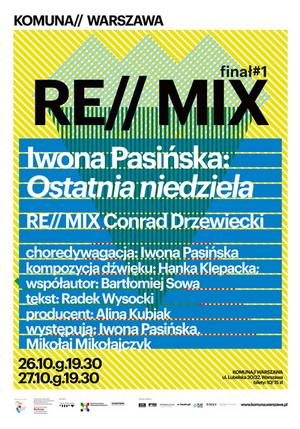
Na zdjęciu: Zespół Bill T. Jones / Arnie Zane z Nowego Jorku, Fot. Lois Greenfield, dzięki uprzejmości New York Live Arts.
On Saturday, 26 October (7:30 pm) komuna//warszawa (ul. Lubelska 32) will launch the RE//MIX FINALE with the premiere of Iwona Pasińska’s Ostatnia niedziela. RE//MIX Conrad Drzewiecki [The Last Sunday: RE//MIX Conrad Drzewiecki]. The piece will then be presented on Sunday, 27 October.
Iwona Pasińska was brought up on the myth of Maestro Drzewiecki; she actually met him as principal dancer of the Polish Dance Theatre when he worked on Śmierć Izoldy(The Death of Isolde) andPieśń Roksany (The Song of Roksana). The confrontation of a myth and reality inspired her to reflect on Drzewicki’s real role on the Polish dance scene. Unequivocally adored and praised as the ideal of form and content, the maestro snared Polish dance in an aesthetic-conceptual trap which he himself could or would not escape. Setting up norms of making a performance, he also set up standards of its reception. The conventions, habitually accepted by audiences’, have made it impossible for Maestro Drzewicki and his successors to get Polish dance theatre out of the box. One might also ask what stands behind this accepted form.
During 1986 Ballet Meetings in Łódź Drzewiecki premiered his Ostatnia niedziela [The Last Sunday]. Booed and disapproved of, it was the master’s first flop. It was also a proof that experimenting with Drzewicki’s own constructions was more difficult for the artist than following the beaten track to glory.
Iwona Pasińska is a theatrologist, choreographer, and dancer. She graduated from the Feliks Parnell Ballet School in Łódź. She holds a degree in theatre theory from the Adam Mickiewicz University in Poznań, where she also did her PhD, focusing on body expression in contemporary theatre. For a few years now she has been pursuing her independent projects within Movements Factory. She regularly collaborates with dramatic, fringe and opera theatres (she has worked as choreographer and movement director with Igor Gorzkowski, Marcin Liber, Piotr Kruszczyński, Natalia Babińska, Claudia Castellucci and Andrzej Dziuk). She is interested in movement in all kinds of public performance. For years she had been dancer with Ewa Wycichowska’s Polish Dance Theatre (principal dancer 1997–2008). It is at that company that she debuted as choreographer.
Mikołaj Mikołajczyk is a dancer, choreographer and director. He graduated from the Ballet School in Poznań, studied sociology and art history at the Adam Mickiewicz University in Poznań, and worked with a range of Polish and foreign theatres, including the Henryk Tomaszewski Mime Theatre in Wrocław, Ewa Wyciechowska’s Polish Dance Theatre, Grand Theatre in Poznań, Badisches Staatstheater in Karlsruhe. He has collaborated with a number of artists, creating both ballet and dramatic performances. For some time now he has also been developing his own projects, the most notable example of which is the monodrama Tryptyk(Triptych), made up of three fully-fledged parts: Waiting,Z Tobą chcę oglądać świat (With you I want to watch the world),and Plaisir D’amour. He often works as choreographer with dramatic and opera theatres, collaborating with Poland’s leading directors (incl. Maja Kleczewska, Krzysztof Warlikowski, Piotr Kruszczyński, Małgorzata Dziewulska, Grzegorz Jarzyna). In 2012 he created a re//mix devoted to Henryk Tomaszewski. He met Maestro Drzewiecki in the 1990s while performing at the Poznań Opera.
Conrad Drzewiecki(1926–2007) was a ballet maestro without whom Polish dance theatre’s history would be blank pages only. Called a reformer of Polish ballet, he was a choreographer, dancer, teacher. He spent the late 1950s and early 1960s abroad, mostly in Italy and France, where he advanced his skills and qualifications in the theory and teaching of classical dance, jazz dance, contemporary dance and ethnical dance. In 1973 he founded the Polish Dance Theatre (PTT), and led it until 1987, bringing his own idea of dance theatre to life. The company’s repertoire soon expanded to include Drzewiecki’s earlier works, such as Pawana na śmierć Infantki (Pavane for a Dead Princess),Cudowny mandaryn (The Wonderful Mandarin),Adagio na smyczki i organy (Adagio for violin, strings and organ),or Wariacje 4:4 (Variations 4:4). His special project were Polish evenings at the PTT, showcasing Polish material only. Explorations focusing on national identity were an important theme of Drzewicki’s artistic work.
choreographic reflections: Iwona Pasińska
text: Radek Wysocki
sound composition: Hanka Klepacka in association with Bartłomiej Sowa
producer: Alina Kubiak
performers: Iwona Pasińska, Mikołaj Mikołajczyk
***
How to get there from the city centre: by tram – routes 7, 8, 22; or by bus – route 517
(get off at Zieleniecka)
or by SKM commuter train (get off at Warszawa Wschodnia).